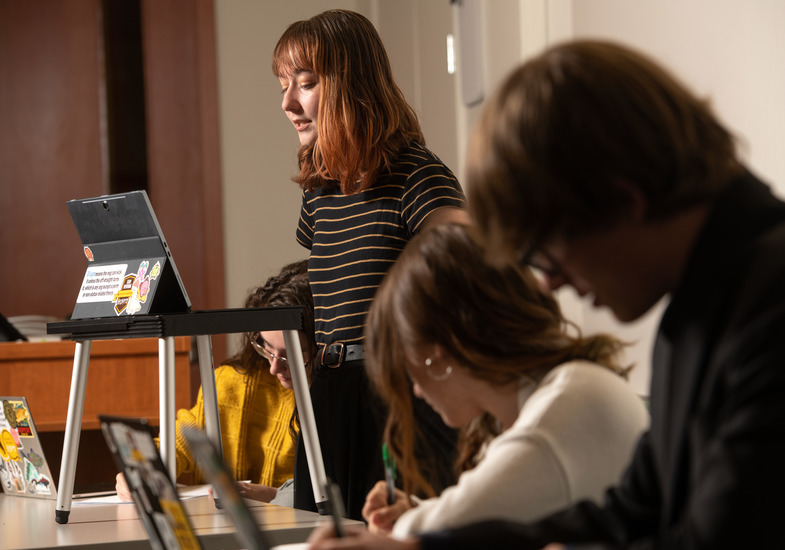Areas of Study
Human Communication
Study many different areas, such as cross-cultural communication, interpersonal communication, small group communication, rhetoric (from ancient to 21st century to visual communication), communication apprehension, and more. The graduate curriculum addresses six major areas of inquiry in human communication: (1) the structure and function of contemporary epistemological, ontological, theoretical, and methodological paradigms in the communication discipline; (2) theories of language and nonverbal symbolic interactions; (3) communication processes in organizational settings; (4) communication as an agent of stability and change in diverse social systems; (5) the role assumed by communication processes in the formation, development, and coordination of intimate human relationships; and (6) the nature and function of argumentative discourse in democratic societies.
Faculty members who research human communication include Dr. Sandy Hsu, Dr. Li Li, Dr. David Rooney, Beau Bingham, and Justin Stewart.
Media Communication
Study both traditional and new media including advertising, public relations, visual communication, radio and audio, blogging, news, entertainment, political communication, and other forms of Internet and mobile-driven communication. The master's program in mass media addresses media issues and problems from a theoretical perspective. The program is designed to be flexible so that students can examine questions that relate to their specific interests in the media. Again, areas of interest include but are not limited to, print media, new media, broadcasting, advertising, and public relations.
Faculty members who research media communication include Dr. Hye Soo Nah, Dr. Cindy Price Schultz, Mitzi Stewart, Kayla Clark, and Dr. Shane Epping.
Choose Your Degree Path
Students can complete a traditional research-oriented thesis or a professional-project. Full-time students will need to decide by the end of their second semester which type of project they will select.
Thesis
- A traditional research-oriented thesis
- 27 credit hours + 4 hours of thesis credits
- A minimum of 25 hours must be taken within the COJO department, with a maximum of 6 hours of independent study, 3 hours of internship credit hours, and 3 hours of 4000-level coursework.
Professional Project
- A project that may involve various forms of communication, including visual (photography, printed materials), audio (podcasts), video (documentaries), and more.
- 30 credit hours + 3 hours of Graduate Project credits (for a total of 33 credit hours)
- A minimum of 27 hours must be taken within the COJO department, with a maximum of 6 hours of independent study, 3 hours of internship credit hours, and 6 hours of 4000-level coursework.

Class Schedule
Nine credits a semester is considered full-time. Required classes are completed in the first year so that the second year can be used to develop and complete the thesis or project. A typical schedule for a full-time student looks like:
Fall, Year 1:
- COJO 5080 – Qualitative Research Methods (required)
- COJO 5800 – Foundations of Journalism and Communication (required)
- COJO Elective or theory class (to meet theory requirement). For public speaking Graduate Teaching Assistants, their third course is a three hour graduate teaching practicum.
Spring, Year 1:
- COJO 5070 – Quantitative Research Methods (required)
- COJO Elective or theory class (to meet theory requirement)
- COJO Elective
- * Graduate Teaching Assistants add 1 hour of Practicum.
Fall, Year 2:
- COJO 5890 – Independent Study (to develop thesis/project prospectus)
- COJO Elective
- COJO Elective
- * Graduate Teaching Assistants add 1 hour of Practicum.
Spring, Year 2:
- COJO 5960 for Thesis Research or COJO 5961 for Plan B Graduate Projects
- COJO Electives/Additional classes for Professional Project
- * Graduate Teaching Assistants add 1 hour of Practicum.
Courses
The University of Wyoming COJO Graduate Program offers a variety of in-depth classes for master's students. Below is a listing of coursework. Read the course descriptions in the University Catalog.
- COJO 5030 Seminar in Interpersonal Communication
- COJO 5040 Digital Video Production
- COJO 5061 Rhetorical Theory and Criticism
- COJO 5070 Quantitative Research Methods
- COJO 5080 Qualitative Research Methods
- COJO 5140 Nonverbal Communication Studies
- COJO 5160 African American Rhetoric
- COJO 5200 Visual Communication
- COJO 5210 Special Topics in Communication*
- COJO 5230 Special Topics in Media*
- COJO 5233 Race, Gender, Ethnicity in the Media
- COJO 5250 Seminar in Organizational Communication
- COJO 5310 Mass Communication Theory
- COJO 5530 Website Design
- COJO 5540 Seminar in Communication Theory
- COJO 5620 Intergroup Communication
- COJO 5640 Comm Apprehension and Competence
- COJO 5700 Media, Science, and Society
- COJO 5800 Foundations of Graduate Study in Communication
- COJO 5890 Problems in Communication and Mass Media
- COJO 5900 Practicum in College Teaching
- COJO 5960 Thesis Research
- COJO 5961 Graduate Projects
- COJO 5985 Rhetoric and Social Justice
- COJO 5990 Internship
*Special topics classes include Creativity/Entrepreneurship and Instructional Communication, as well as other classes that reflect the expertise of our faculty.


